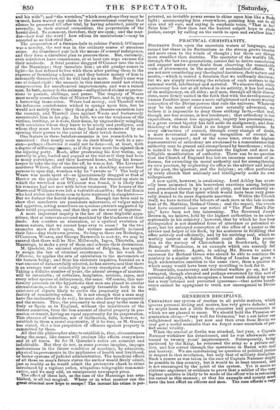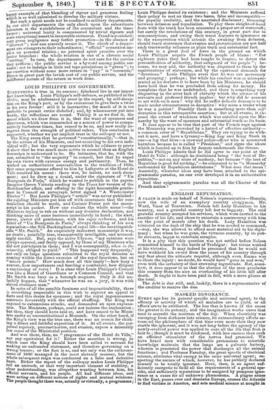GENEROUS DISCIPLINE.
CERTAINLY our system of routine in all public matters which ignores personal feeling and motive, has very grave defects; and we might learn not a little from countries and governments at which we are pleased to sneer. We should hold the Prussian or- ganization cheap—" very well for Germans," but a cut below our enlightened methods ; yet now and then even from Berlin we may get a useful memento that we forget some essentials of per- fect social vitality. When the arsenal at Berlin was attacked, last year, a Captain Natzmer withdrew his detachment, and he was afterwards sen- tenced to twenty years' imprisonment. Subsequently, being pardoned by the King, he reentered the army as a private sol- dier, and has served through the operations in Baden with zeal and bravery. We are entertaining no question of political justice in respect to that revolution, but only that of military discipline. Such a course as was taken in the case of Captain Natzmer might be possible in this country, but it would be at least unusual, and is not encouraged by the spirit of the system. Yet it needs no elaborate argument or evidence to prove that a soldier of the very highest qualities is likely to be made of the officer who is retracing his career in this manner • or that his example and society mutt have the best effect on officers and men. The case affords a veil happy example of that blending of rigour and generous feeling which is so well calculated to develop the military virtues. But such a spirit needs not be confined to military departments. In our civil departments the only check upon the subordinate labourers is the watchfulness of the accountant and the time- keeper ; universal laxity is compensated by trivial rigours and sonic e exceptional resort to inexorable sternness. Fraud is punished; very gross negligence may forfeit promotion—in the absence of interest "; zeal can scarcely secure it. The chiefs of a depart- ment are strangers to their subordinates; "official" connexion im- plies no personal relation ; no paternal spirit presides over the junior branches : the whole relation is one of a chronic social "cutting." In turn, the departments do not care for the service they perform; the public service is a byword among public ser- vants : not to indulge in little red tape peculations is "green"; to use exertion without some more return in "pay" is "eccentric." Hence in great part the lavish cost of our public service, and the indifferent nature of the return in work done.



























 Previous page
Previous page